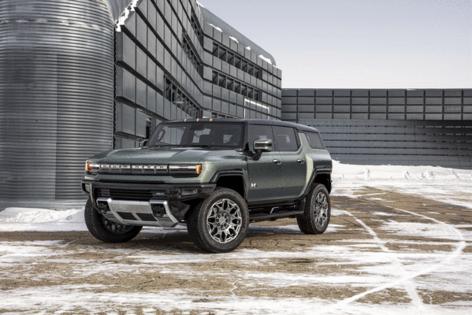GM optimistic about EVs, despite $150 million hiccup and return of hybrids
Published in Automotive News
WASHINGTON — General Motors Co. built 20,000 electric vehicles earlier this year that did not qualify for the federal EV tax credit, Chief Financial Officer Paul Jacobson said Tuesday.
That could cost the automaker $150 million, thanks to the company’s Ultium Promise program which will pay out a $7,500 credit to all customers anyway.
“Us being there for the customer so that we have a very consistent face, taking the risk on ourselves and then adjusting the supply chain adjusting the manufacturing to make sure that we can comply with (tax credit rules) — that's our responsibility,” Jacobson said.
GM temporarily lost tax credit eligibility for the Cadillac LYRIQ and Chevrolet Blazer EV in January due to changes from the U.S. Treasury Department and Internal Revenue Service.
Despite hiccups like that one, uncertain regulatory conditions moving forward and slowing demand for EVs overall, Jacobson reaffirmed GM’s commitment to EVs and urged patience for that area of its business during a wide-ranging discussion at the Securing American Future Energy summit. John Bozzella, the president of the Alliance for Automotive Innovation, an automotive trade association, led the discussion.
“Some people will draw a linear line. Some of them will draw exponential curves,” Jacobson said of EV adoption. “But the one thing they have in common is they're all smooth. And I want to tell them it's never going to look smooth.”
“It’s going to look like this,” he said, gesturing to indicate a more erratic growth curve. Jacobson emphasized that even though demand has slowed down, it is still growing: “I think a lot of that gets lost in the narrative."
He also emphasized that EV consideration is at an “all-time high.” He suggested that efforts across the industry to promote the new products and positive word-of-mouth testimonials are reaching mainstream consumers, even if they’re not ready to purchase EVs yet.
A survey from J.D. Power from June of last year found that 61% of shoppers are “overall likely” to consider purchasing an EV. That represents a slight increase from the 59% recorded in 2022.
Still, GM has needed to change its approach, he acknowledged: “We stress being nimble in the organization because we know this thing is going to change 100 times between now and 2035 and beyond. We just need to be there to meet the customer where they are.”
The company’s decision to bring back gas-electric hybrid vehicles, he said, will address consumer hesitation over fully electric vehicles and help comply with new, fast-approaching regulatory requirements.
Jacobson said plug-in hybrid vehicles, which can travel short distances on battery power, are a good “bridge product” for consumers who still want the security of a gas tank.
Asked about requirements of the Inflation Reduction Act that disqualify vehicles made using too many raw materials from China and other foreign entities of concern, Jacobson highlighted partnerships with South Korean battery companies POSCO Future M Co., LG Chem Ltd. and Samsung SDI Co.
GM started thinking more critically about raw materials sourcing well before passage of the IRA in 2022.
Jacobson said: “When you looked at the effects that the pandemic had across global logistics, we were out there trying to de-risk some of that supply chain because we found that even things in regions that weren't affected by COVID — the shipments on the water were, or the shipments through the air, etc.
“We have gotten far more vertically oriented than any time in the past. And if you look at the history, it went from owning everything to owning nothing, to now having to cooperate at all levels.”
Asked about challenges ahead, Jacobson identified critical minerals processing, particularly for lithium and nickel, as the “number one” investment gap for the U.S. auto industry: “We've done a good job of securing supply, but the processing capabilities across the world are pretty limited and fairly concentrated."
Globally, Jacobson said that the transition to electric vehicles would require hundreds of billions of dollars across several industries. He projected confidence related to the company’s position within the transition.
“GM has done an incredible job generating record levels of cash flow, which is helping to fund this journey, while also making sure that shareholders are getting a return on the investment.”
©2024 www.detroitnews.com. Visit at detroitnews.com. Distributed by Tribune Content Agency, LLC.







Comments